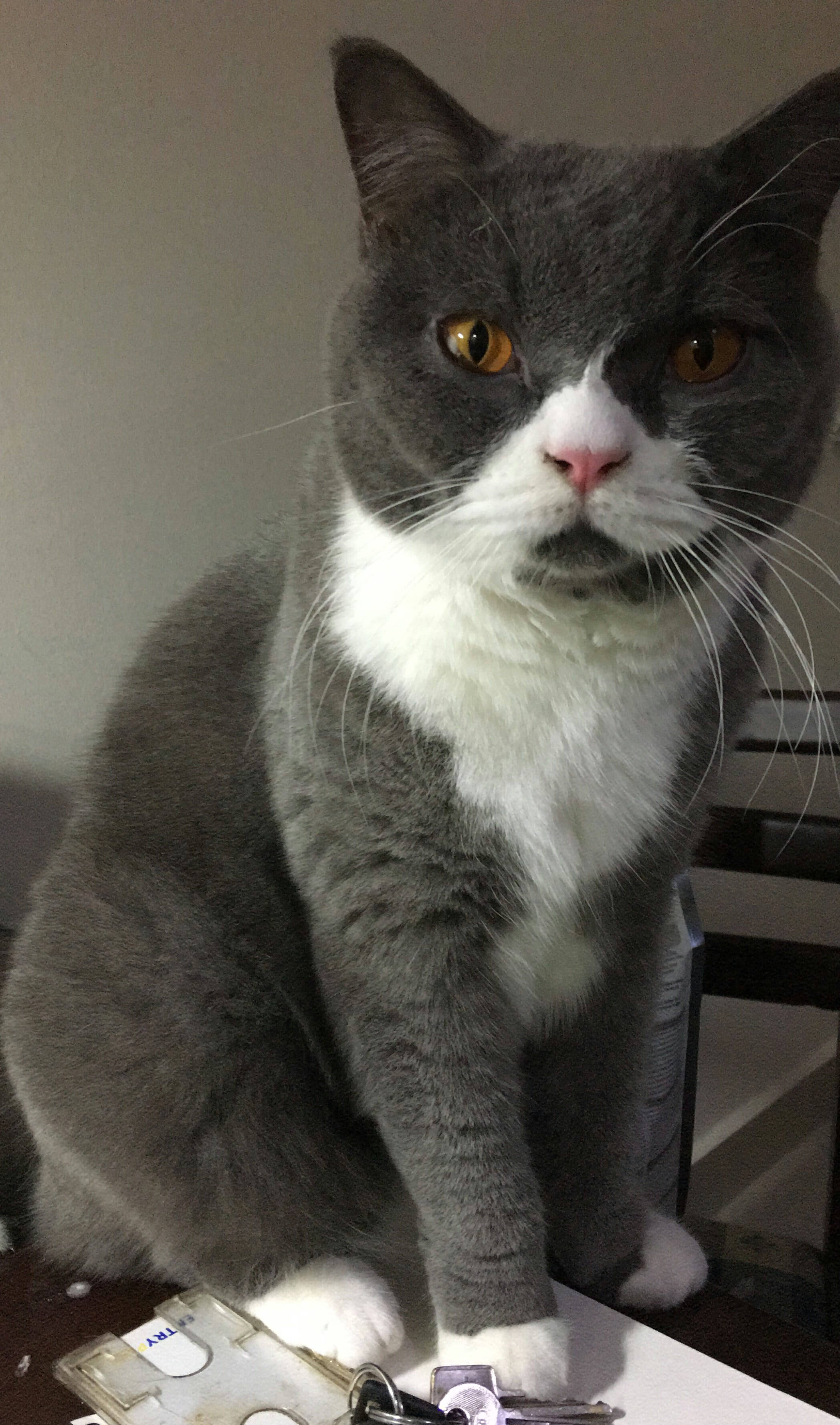Hey man – Life’s tough. Whether you’re behind on your bills, unhappy with how you look, or just feel crappy watching your friends’ picture-perfect lives on Instagram – we all feel like we’re stuck sometimes.
If you’re feeling that way – hang in there. Here are 4 practical tips for getting out of a rut.

That’s my cat (maru), telling you you’d better not give up too.
So, let’s start – the first thing you should do is…
Focus on The Good Things (However Small They May Be)
I don’t care how bad things are for you right now, I know that there’s something good in your life. Just be objective and ask yourself – what’s something I have which someone else might want?

For me, i have the love of these two fur babies.
Maybe it’s your robust health. Maybe it’s your loving friends and family. Maybe it’s your kickass career.
Whatever it is, I guarantee you – someone else desperately wants it.
I know, I know, the grass being greener on the other side is so cliché it’s proverbial. But the idea is to show you that throughout your life, you did get a few things right.
So don’t be too hard on yourself.
I mean, yeah, there are parts of your life which we’ll need to work on (and we’ll get to it in a bit), but for now just be thankful. Recognise that it isn’t all bad, and appreciate the thing(s) which haven’t turned to shit.
Like Wonder Woman giving you a wink for example.

I’m not just being sentimental. Being grateful is literally good for your physical and psychological health. It’s a small start, but hey, let’s take what we can.
Once you’ve appreciated the good things in life, it’s time to start actually being productive. If you want to dig yourself out of a rut, know that…
Problems Can Be Difficult to Solve, but Not Impossible
Here’s the thing, most problems are difficult to solve – but not impossible.
Unfortunately, most of us can’t see that because we focus on all of our problems at the same time. Instead of it being a series of small-to-medium problems with separate solutions, your mind thinks of it as a huge problem that just can’t be tackled.
So your mind stops working and you just… shut down. Your exhausted brain just assumes that there are no solutions to a problem that big.
But that’s ludicrous. Nobody looks at Mount Everest from a distance and immediately comes up with a plan to scale it.
It’s the same with your problems. If you just look at the big picture, you can’t see the solution. It just seems impossible.
But – if you break your problem into smaller, easier-to-solve chunks, it becomes a whole other story.
For example, let’s say you weighed 250 kilos, and your ideal weight is 70 kilos. Trying to lose 180 kilos sounds colossal. I mean, how many years of dieting and working out is that? Just how many bland chicken breasts do you have to eat?

Yuck.
Of course, when you put it that way, it sounds crazy. No one is going to embrace eating bland chicken breast for the rest of their lives.
But if you break it down, it becomes like a video game. Choose your own difficulty.
Maybe you can’t stand chicken breast now, but can you can start by cutting out all sugary drinks from your diet? Still too hard? No problem. Break it down even further – can you do one push-up a day? Still difficult? No worries! Start by just literally flailing your arms around.
Eventually, you’ll hit a point where even you know you can do more.
Ideally, you should start a bit more than that. You’d want to be just outside your comfort zone, so you actually make progress.
Once you get better – and trust me you will – things will get easier and you’ll be able to do more. That’s when you raise the bar higher.
Continue doing this, and before you know it, you’ll be at the peak of Mount Everest.
The key here really is just to get started. Letting our problems fester in our mind makes it grow. We become more anxious because we’re not doing anything about it.
But once you actively take charge of the problem, it becomes smaller, and the solution starts to build momentum. From that point on, all you need to do is keep going.
Of course, you’ll need help. The good news is, you can get it, because you also…
Have Access to the Best Resource Available in the 21st Century
If you’re reading this article, it’s safe to assume one thing about you – that you have the internet.
Now that’s a great perk.
I’m not being patronising. You might think it’s not a big deal, but as of last year, only 54.4% of the world had access to the internet.
That means that 45% of the world has no idea what a meme is.

Nor do they know who this is. (source: https://www. Pinterest. Com)
You might think, “Yeah, yeah, so I have internet. Big freaking deal. How does that solve my problem?”
Well, in a lot of ways.
Having access to the internet gives you access to a wealth of resources. It’s important enough that the United Nations has deemed access to the internet as a basic human right.
You see, having access to the internet doesn’t just mean you can laugh at memes and cat pics – it opens up a ton of opportunities. It connects you with people who are either in your same situation, people who can help you, or both.
If you’re depressed for example, there’s plenty of resources online to get help. You can connect with strangers who are going through exactly what you’re going through (and you can ask their advice on what to do next).
Single? Online dating is one of the quickest ways of meeting people. Broke? You can send your resume to 20 companies who are hiring within the next hour.
Regardless of whether you want to lose weight or develop a new skill – you can find all the information you need online. There’re even places where you can be certified professionally. For free.
My point is, whatever rut you’re stuck in right now, you have incredibly powerful tools at your disposal. I mean, think about the people in your position 50 years ago – it was a lot harder for them to get help, or help themselves.
Today, all you need to do is go to Google and search for information. Whatever problems you’re having, chances are, someone’s posted the solution on YouTube.
But knowledge alone isn’t enough. There’s one other thing you need to practise, which is…
Don’t Give Up
Because of the internet, most of you have probably heard of the learned helplessness theory. In case you haven’t, let me explain it to you briefly.
Learned helplessness is when a person or an animal is repeatedly subjected to something painful which they can’t escape or avoid. After a certain period, the subject ‘learns’ that there’s nothing it can do against this, so it just… gives up.
Martin Seligman, an American psychologist, actually came up with this theory based on his infamous experiment. I won’t go into too much detail, but it’s pretty fucked up.
Basically, he conducted two experiments – the first one, he subjected a group of dogs to a series of random shocks. One group of dogs could end the shocks by simply pressing a lever. The other group of dogs had no control over the shocks.
In the second experiment, he placed both groups of dogs into a low-partitioned chamber. The floor of one side of the chamber delivered shocks to the dogs inside them. The other was a normal floor.
To escape the shocks, the dogs could easily jump over the partition onto the non-electric side.
The dogs which had control over the shocks previously quickly learned to jump over the partition onto safety.
The dogs which couldn’t control the shocks earlier, they simply gave up. They sat down and endured the torture (even when they could just as easily have jumped over the partition).
The experiment is disturbing, but it does teach us something – when you feel like you’ve got no control over your life, the natural tendency is to just give up. When you’ve constantly been subjected to pain, whether physical, psychological, or emotional, you stop fighting back. You assume that this is how it’s always going to be.
But if you want to get out of a rut, you must break this mindset.
Look, I get it – life is hard. When things haven’t been going your way for a while, it’s easy to just lie on the floor and give up.
But failure is only permanent once you stop trying. Every time you fail, you’re learning a lesson which makes you better.
Eventually, you’ll know so much that you there’s no other possibility but to succeed.
So hang in there, don’t give up, and keep trying. I promise you that eventually, you’ll get out of this rut.
Since there’s been enough dog abuse in this last paragraph, let’s end this article with a picture of this good boye.

We’re rooting for you! (source: https://www. Boredpanda. Com/cute-expressive-dog-shiba-inu-ryuji-japan/)
You might also like: How to Fall in Love with Yourself When You’re Not Feeling Good Enough
More from Real Mental Health
“I Was Scared of Waking Up in Handcuffs,” shares Depressed M’sian on Repealed Law
In 2023, Malaysia repealed Section 309, a colonial-era law that made suicide attempts a crime. The change marked a shift …
‘Everyone Saw A Successful Student While I Was Crumbling,’ Shares 22 Year Old Student
This is a story of a 22 year old woman who shared her story as a Straight A’s student as …
5 Harmful Mental Health Myths Malaysians Still Believe
Let’s break down five of the most common myths Malaysians still believe, and why it’s time to let them go.














